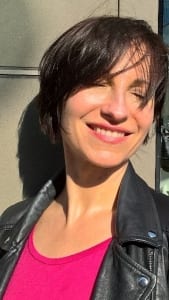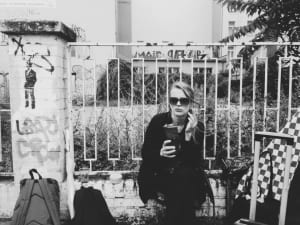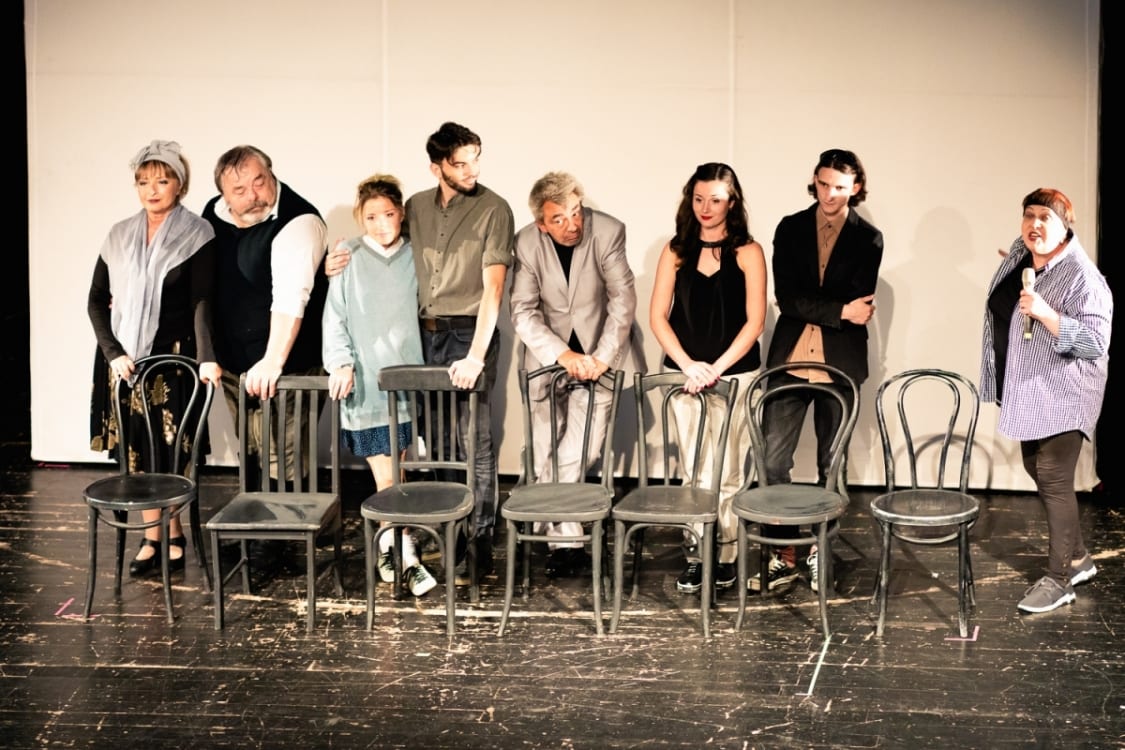I meet Agata Siwiak in the glamorous downstairs bar and cabaret space at Teatr Polski in Poznan. It is the second day of the festival for which she is the artistic director, The ‘Close Strangers’ festival – which is putting on plays every night for a week either about the Ukrainian experience in Poland or by Ukrainian artists – in their own language and translated into Polish through subtitles.

Agata is passionate about making theatre a vehicle for public debate. The festival was originally programmed to have three themes – LGBT rights, antisemitism and the Ukrainian experience. But she was persuaded that the latter has the least voice and focus and to do it justice should be the sole focus of the festival.
“More than 40% of Polish people are not too positive about Ukrainians living here. Just 17% are positive. It’s not good. And usually, we are against something because we are afraid of because we don’t know about it. So this title of the festival ‘close strangers’ really has some kind of very special value.”
However, it is not that issues of gender, sexuality and racism don’t come up. Because – as Agata says “course because they must be issues within their Ukrainian community the same exactly as in Poland.”
The history between the two countries has many scars – not least disputed land and wars. The last play of the run ‘We will not give up the lions’ addresses this directly, looking at how modern politicians use memory to stir up hatred for current political purposes. So the play is bookended by Polish plays about the relationship but as Agata says, ‘nothing about us without us’ is an important principle, which is why the majority of the performances are Ukrainian.
“I felt we should absolutely invite Ukrainian theatres to find out something about their culture and especially that their politics and public sphere has quite a lot in common with ours. For example, the feminist battle is very strong here and in Ukraine. There is also a terrible problem in Poland of corruption but this is very often the problem of post-Soviet countries in a newly capitalist society. So really a lot of not nice things, but they make us close.”
One of the hardest things Agata found was actually reaching the Ukrainian community who are based in Poznan. There aren’t any organised media for them you could target, so she went through foundations set up to assist the community with visa issues etc.
One struggle is that the Ukrainian workforce works exceptionally long hours. It is hard for them to find time for theatre. But through networks, discounted offers of tickets (funded by charging VIPs for the tickets they are usually given free) and at one point literally going door to door, she is hopeful that they will be represented in the audience as well as on stage.
At this point, we are joined by Joanna Wichowska – who is a vital part of the theatre movement in both Poland and Ukraine. She describes herself as an ambassador for Ukrainain theatre in Poland – as she believes this is a region that has been overlooked. “We either look to the west or we look to the east, but to Russia over Ukraine, Ukraine is seen in Poland as some weird place of wild people not so interesting in terms of the art, which is definitely not true.”

She was also the writer of Beautiful, Beautiful, Beautiful Times which was one of the Ukrainian language plays at the festival. It’s an incredibly powerful and moving piece about violence and its effects on societies and individuals.
Previously a critic, Joanna has moved more into dramaturgy and production. But for her she sees this just as an expansion. “It was always like combining different activities in frame of the theatre. I’m not a specialist, you know, I just want a little bit of everything.”
Her preference is for more experimental theatre which absolutely shines through the programming of the festival – particularly the Ukrainian pieces. They are very experimental using different forms of theatre, choreography and music and very minimalist in terms of the set. Even Beautiful, Beautiful… while being structured like a more traditional play breaks the fourth wall constantly. A deliberate choice for Joanna “This is also political for me, to say “this is okay, you don’t have to believe in everything that I say”. So it’s making sure that people continue questioning. The characters are being acted, but there are still questions in this theatre as as a theatre. As a place like a church.”
Where Agata is more optimistic, even evangelical about art, Joanna descibes herself as more sceptical though optimistic that her art can have a Butterfly effect.
“My medium is to communicate. That’s my job and when I can do something that I think is proper for the place I live, for the people, I can do it through this medium. I think it can change even the ideas of a few people and you never know what the influence of this will be.”
The symbol of the festival is an artistic mock up of the flags of Poland and Ukraine combined. It is a powerful and political act in Poland simply to see that proudly on display outside the Theatr Polski. Joanna says “That’s a symbol and these are important. That’s the beauty of art.”
That indeed is the beauty of art and of theatre. And as the festival continues, it has hopefully started a vital dialogue between two communities. And hopefully close strangers can start to become close friends.

